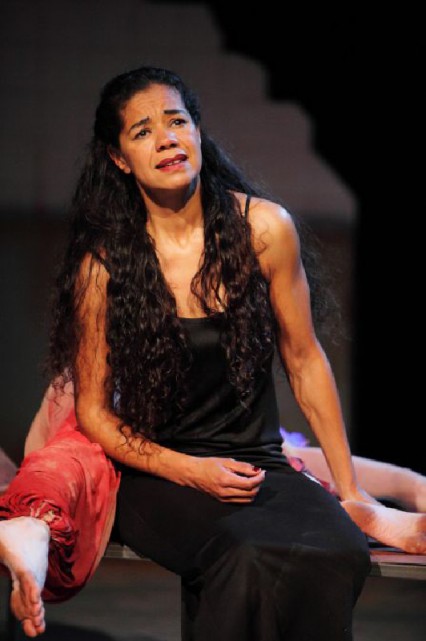Penny Simpson reviews Gwyneth Lewis’s first stage play, Clytemnestra, at the Sherman Cymru, inspired by a story from Aeschylus’s Oresteia.
A story from Aeschylus’s Oresteia is the inspiration for Gywneth Lewis’s first stage play, one which subverts its original source material with great assurance and fluency. Clytemnestra is given a voice which echoes down the centuries, the voice of a grieving mother whose child has been unlawfully killed. Following an unnamed war, Agamemnon has bartered his daughter Iphigenia in a deal for food in a country where rival tribes fight over scarce resources. The deal has not panned out as he hoped, to put it mildly.
The drama unfolds in a near dystopian future where the ravages of war have turned the moral high ground quite literally into a ‘kill floor.’ The setting shift-

Clytemnestra
by Gwyneth Lewis
Sherman Cymru
Director: Amy Hodge
Cast: Rhian Blythe, Matthew Bulgo, Jaye Griffiths, Nia Gwynne
Lewis’s brutal storyline is layered with diverse voices, achieved through allowing each of her central characters to be partnered by a Fury. These figures embody the characters’ more primitive desires, primarily the desire for revenge. They writhe and slither across the stage, shadowing the protagonists in an increasingly demented fashion, as well as throwing into stark relief the conflicting emotions of Clytemnestra, her surviving daughter Electra and Aegisthus, Agamemnon’s cousin. This trio of blood relatives are engulfed in their own private war, set into motion by a murderous past which is not to be defeated until more blood is spilt. Whilst the ending is never in doubt, it is challenged by the trio who seek to justify their actions even as they are being manipulated by their malicious and determined Furies. Clytemnestra is unquestionably a woman wronged. Tormented with grief, she falls in to the trap that the seer Cassandra identifies at the outset: once someone acts they think less. And so the bloody spiral spins on.
In spite of its title, this feels like an ensemble production with an array of pitch perfect performances. Jaye Griffiths’s Clytemnestra is stunning. On first sight, she’s a baying she-
Nick Moss has the unenviable task of making Agamemnon appear less of a monster than is suggested, something he achieves when he finally shows his paternal instincts. On his journey home from war, he takes pity on a distressed young woman. It’s Cassandra, the seer, beautifully portrayed by Kezrena James as a girl-
Director Amy Hodge brings a deft touch to her staging of the play, punctuating the action with some electrifying images which lend additional colour and weight to Lewis’s poetic, but spare, text. In a recent interview, Lewis said she wanted to write a sequel. It’s not a bad idea.
You might also like…
Marine Furet reviews National Theatre Wales’s Constellation Street, part of their Network programme of digital work that was launched in response to the COVID-19 lockdown, and finds a play that is successful in mixing gritty social realism and tragedy through four dramatic monologues.
Penny Simpson is a regular contributor for Wales Arts Review.












